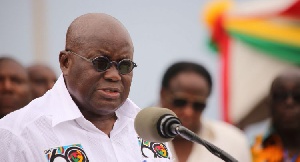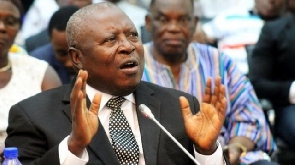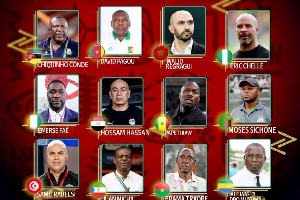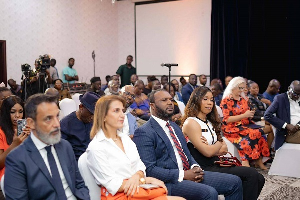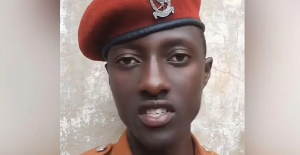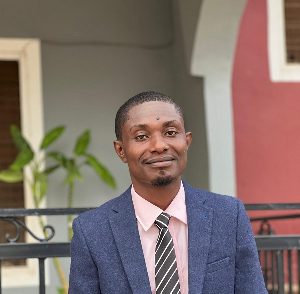Good morning fellow Ghanaians.
Education, we can say is the passport to the future, this is because tomorrow belongs to those who prepare for it today.
It is therefore evident that, an investment in knowledge pays the best interest.
The function of education is to teach one to think intensively and to think critically.
In a nut shell, Intelligence plus character should be the goal of any true education.
Since Ghana's independence, successive governments have demonstrated their recognition of the importance of education to national development, by pursuing policies aimed at making education accessible to all and relevant to the social, industrial and technological development of the country.
This made Ghana's first President, Osagyefo Dr.Kwame Nkrumah, initiated the Education Act 1961, Act 87, aimed at achieving Free Universal Primary Education.
Our country's educational system is divided in three parts: Basic Education, Secondary Cycle and Tertiary Education.
Basic Education lasts 11 years (Age 4-15) Kindergarten (2 years), Primary School (2 modules of 3 years) and Junior High school (3 years).
Ghana is a multilingual country in which about eighty different languages are spoken. Of these, English which was inherited from the colonial era, is the official language and Lingua Franca.
It is against this background, English Language has been introduced to our Kindergarten Pupils in their early school life.
In 2015, there were 38 Colleges of Education in Ghana, responsible for teacher education.
A further five private colleges were to be absorbed into the group of 38 public institutions, raising the number to 43.
In all the above Colleges of Education, teachers are trained to enable them handle our Lingua Franca which is the English Language.
This is the reason why all pupils in Ghana are taught English from Kindergarten, Primary through to Junior High Schools etc
Currently there is dwindling quality of education in Ghana and this has been a serious headache for the nation as a whole. What are the causes?
There was a publication on Tuesday 2nd September, 2014 which indicated 98% of primary two pupils can neither read nor understand English or any Ghanaian language properly.
This was contained in the “Early Grade Reading Assessment” report commissioned by the Ghana Education Service (GES) for primary two pupils.
This was carried out by the Assessment Services Unit (ASU) of the GES with support from the Research Triangle International (RTI) a project which was funded by the USAID.
This tells us that, we have problem with even our "darling" Lingua Franca and it is for us as a nation to identify that, there are real challenges that we need to deal with.
The challenge is that, majority of our Ghanaian School pupils cannot read and understand English and this is affecting their academic work seriously because apart of Ghanaian Language all other subjects are taught in the English Language.
Have we as a country sat down to tackle this challenge?Do we have qualified trained teachers in all our Kindergartens across the country? Are all schools having Kindergartens? What proper assessment do we have on private nursery schools that feed some of our public primary schools?
President Akufo-Addo has given strong indications that, French language would be made compulsory from the next academic year in 2017 from basic school through to Senior High Schools this he said when he addressed the Ghanaian community in neighbouring Togo as part of his three country tour.
This l believe is a total myth and just honey words which cannot see the light of day in September 2017 Academic Year as said by the President.
According to the president, it is unacceptable for Ghana which is bordered on the East, West and North by three French speaking countries not to show interest in the French language.
I don't think the issue here should be of "unacceptable" as the President put it.
It is not a bad idea at all for French Language to be studied in all our schools from basic etc.
But the issues are, have we as a country addressed the inability of Ghanaian School Pupils to read and understand our Lingua Franca thus the English Language before will be in another haste or rush to add another language? There is a saying that "jack of all trade is master of none “is that what we want to practice?
This policy must be extensively discussed among the stakeholders in the educational sector and the entire country as a whole for the necessary steps and measures to be put in place for possible take off and its sustainability.
This has not even yet started and we are in May. When this is not done the policy cannot see the light of day.
It would be recalled Former Prez Agyekum Kuffour in 2004 indicated "Government to encourage learning of French in Ghana"
Two training colleges have started training teachers to teach French in schools as part of the government's policy to encourage the learning of French- the official language of the country's immediate neighbours.
These are the Wesley College in Kumasi and the Bagabaga Training College in Tamale. This would augment the effort of Mount Mary Training College in Somanya, which h has historically produced teachers for French.
This was announced in his State of the Nation Address to Parliament.
So one will ask, how many of our Colleges Of Education are training French Teachers currently? How many French Teachers do we have graduating from Colleges of Education each year? How many basic schools do we have in the country? How many French teachers are needed to enable French to be made compulsory in all schools? How many JHS are currently doing French in the country? What is the total number of JHS we have in the country?
So for French to become compulsory, we have a long way to go by putting the necessary steps as President Kufuor started.
It means therefore, all our Colleges of Education in the country must now start to do French as a compulsory Language so that one day we can get there and not just making statement of starting it within a specified time when we do not have available teachers to implement the policy.
As stated earlier, we should also not forget the fact that, most of our Ghanaian School pupils cannot read and understand the English language and l think this disease we must all be eager to cure first before thinking of something else.
We should not be seen as the proverbial "rat" that carries a lot of palm kernel in its mouth but finds it very very difficult to crack any.
Long Live Ghana!
Opinions of Friday, 5 May 2017
Columnist: Mathias Tulasi

